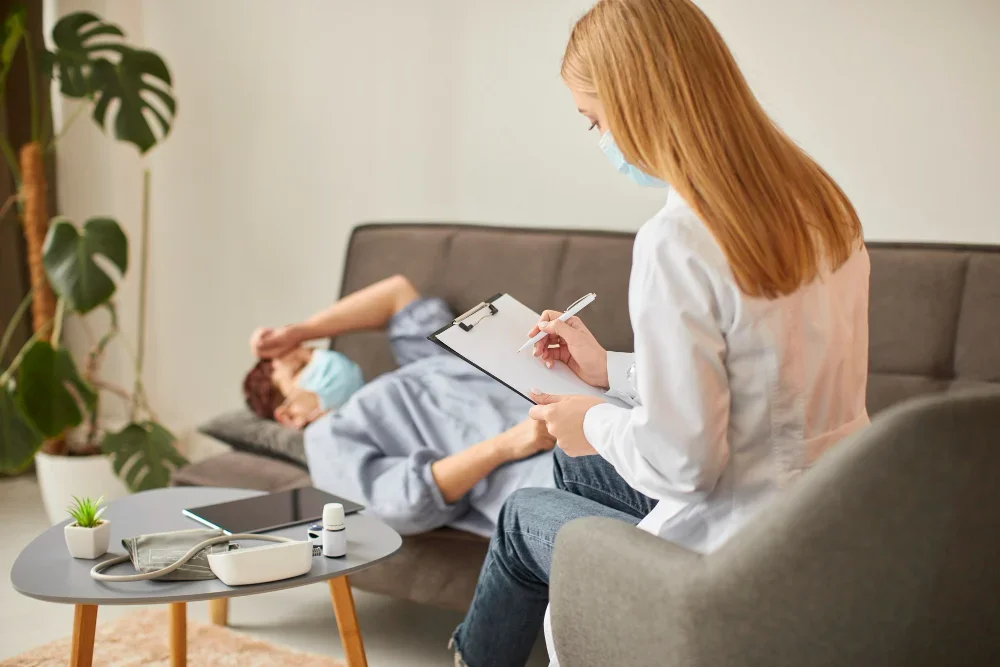Many individuals struggling with depression seek alternatives to pharmaceutical interventions, looking for sustainable approaches to mental wellness. This comprehensive guide explores treating depression without drugs, examining proven strategies such as cognitive behavioral therapy, TMS therapy, and lifestyle modifications that offer effective paths to recovery and long-term relief from depressive symptoms.
Managing depression presents significant challenges for millions of people worldwide, affecting every aspect of daily life, from work performance to personal relationships. While antidepressant medications remain a common treatment approach, many individuals experience concerning side effects or find limited effectiveness from pharmaceutical interventions.
Why Treating Depression Without Drugs is Becoming More Popular
The movement toward treating depression without drugs reflects growing awareness of both medication limitations and the effectiveness of alternative interventions. Many patients report feeling more empowered when actively participating in their recovery through behavioral changes and skill development rather than relying solely on pharmaceutical solutions.
Research increasingly demonstrates that non-drug approaches can be equally effective as medications for many individuals, particularly those with mild to moderate depression. These methods often provide longer-lasting benefits because they address root causes and teach coping strategies that patients can use throughout their lives.

Proven Methods for Treating Depression Without Drugs
Cognitive Behavioral Therapy (CBT)
Cognitive Behavioral Therapy represents one of the most researched and practical approaches to treating depression without drugs. CBT helps individuals identify and modify negative thought patterns that contribute to depressive symptoms, providing useful tools for managing difficult emotions and situations.
The therapy focuses on the connection between thoughts, feelings, and behaviors, teaching patients to recognize when they engage in harmful thinking patterns such as catastrophizing, all-or-nothing thinking, or self-blame. Through guided practice, individuals learn to challenge these thoughts and develop more balanced, realistic perspectives.
CBT sessions typically include homework assignments that help patients practice new skills in real-world situations. These exercises might involve mood tracking, thought-challenging worksheets, or behavioral experiments designed to test negative beliefs about oneself or the world.
The skills learned in CBT become valuable tools that individuals can use long after therapy ends, making it particularly effective for preventing depression relapse and maintaining long-term mental wellness.
Mindfulness and Meditation
Mindfulness practices have shown remarkable effectiveness in helping people understand how to cope with depression without drugs. Regular meditation allows individuals to develop awareness of their thoughts and emotions without becoming overwhelmed by them, creating space between difficult experiences and automatic reactions.
Research demonstrates that mindfulness-based interventions can reduce depression symptoms by helping individuals break cycles of rumination and negative thinking. The practice teaches people to observe their thoughts as temporary mental events rather than absolute truths about themselves or their circumstances.
Simple mindfulness techniques such as focused breathing, body scans, and mindful walking can be easily incorporated into daily routines. These practices help develop emotional regulation skills and reduce the intensity of depressive episodes when they occur.
Exercise and Physical Activity
Physical activity serves as a powerful intervention for treating depression without drugs, with research showing that regular exercise can be as effective as antidepressant medications for many individuals. Exercise stimulates the production of endorphins, serotonin, and other neurochemicals that naturally improve mood and reduce stress.
The benefits of exercise extend beyond immediate mood improvements. Regular physical activity helps regulate sleep patterns, increases energy levels, and provides opportunities for social interaction when done in group settings. The sense of accomplishment from achieving fitness goals also contributes to improved self-esteem and confidence.
Different types of exercise offer various benefits – aerobic activities like running or cycling provide immediate mood boosts, while strength training can improve long-term confidence and body image. Even gentle activities like yoga or walking can provide significant mental health benefits when practiced consistently.
Diet and Nutrition
Nutritional approaches play a significant role in how to combat depression without drugs. The relationship between diet and mental health has become increasingly apparent, with specific nutrients directly affecting neurotransmitter production and brain function.
Key dietary strategies for depression management include:
- Increasing omega-3 fatty acids through fish, nuts, and seeds
- Maintaining stable blood sugar through regular, balanced meals
- Including plenty of fruits and vegetables for essential vitamins and minerals
- Limiting processed foods, excessive sugar, and alcohol consumption
- Ensuring adequate protein intake to support neurotransmitter production
Some individuals find that specific dietary changes, such as reducing inflammation through anti-inflammatory foods or addressing nutrient deficiencies, significantly impact their mood and energy levels.
TMS Therapy: A Non-Invasive Solution for Depression
What is TMS Therapy?
Transcranial Magnetic Stimulation offers an innovative approach to treating depression without drugs through targeted brain stimulation. TMS uses magnetic fields to stimulate specific brain regions involved in mood regulation, particularly the left prefrontal cortex, which shows reduced activity in individuals with depression.
The treatment involves placing a magnetic coil against the patient’s scalp, which generates magnetic pulses similar in strength to those of MRI machines. These pulses create small electrical currents in targeted brain tissue, helping to restore standard neural activity patterns and improve communication between brain regions.
The Benefits of TMS Therapy for Depression
TMS therapy provides several advantages for individuals seeking alternatives to medication-based treatment. The procedure is non-invasive, requires no anesthesia, and allows patients to remain fully conscious throughout treatment sessions.
Clinical studies demonstrate response rates of 50-60% for TMS therapy in patients with treatment-resistant depression. Many individuals experience significant symptom improvement without the side effects associated with antidepressant medications, such as weight gain, sexual dysfunction, or emotional blunting.
The outpatient nature of TMS allows patients to maintain their regular schedules while receiving treatment, with sessions typically lasting 20-40 minutes and requiring no recovery time.
TMS Therapy vs Traditional Treatments
When comparing TMS to traditional depression treatments, the absence of systemic side effects represents a significant advantage. Unlike medications that affect the entire body, TMS provides targeted brain stimulation without impacting other organ systems or causing drug interactions.
TMS therapy can be combined with psychotherapy and other non-pharmaceutical interventions, creating comprehensive treatment approaches that address multiple aspects of depression. This flexibility allows for personalized treatment plans that maximize benefits while minimizing unwanted effects.

How to Cope with Depression Without Drugs: Practical Strategies
Building a Support System
Developing strong social connections plays a crucial role in coping with depression without drugs. Isolation often worsens depressive symptoms, while meaningful relationships provide emotional support, practical assistance, and motivation during difficult periods.
Building a support system might involve strengthening existing relationships, joining support groups, participating in community activities, or working with mental health professionals. The key is creating multiple sources of support that can provide different types of assistance when needed.
Setting Realistic Goals and Expectations
Recovery from depression without medication requires patience and realistic expectations about the timeline for improvement. Unlike drugs that may provide relatively quick symptom relief, non-pharmaceutical approaches typically require consistent effort over weeks or months to show significant benefits.
Setting small, achievable goals helps maintain motivation while building momentum toward larger objectives. These goals might include daily exercise, regular sleep schedules, social activities, or skill-building practices that support long-term recovery.
Stress Management and Relaxation Techniques
Learning effective stress management strategies supports overall efforts in treating depression without drugs. Chronic stress contributes to depression development and maintenance, making stress reduction techniques valuable components of comprehensive treatment plans.
Effective stress management techniques include deep breathing exercises, progressive muscle relaxation, time management strategies, and boundary-setting skills. Regular practice of these techniques helps individuals develop resilience against future stressors while improving current symptoms.
How to Beat Depression Without Drugs: Lifestyle Changes for Long-Term Success
Healthy Routines
Consistent daily routines provide structure and stability that support mental health recovery. Depression often disrupts regular sleep, eating, and activity patterns, making the establishment of healthy routines crucial for long-term recovery.
Effective routines typically include regular sleep and wake times, scheduled meals, planned physical activity, and designated time for self-care activities. These structures help regulate circadian rhythms and provide predictability during periods when motivation feels low.
The key to successful routine development is starting small and gradually building more complex structures as habits become established. Even simple routines like morning and evening rituals can provide significant stability and support for mental wellness.
Engaging in Meaningful Activities
Participating in activities that provide purpose and satisfaction helps individuals learn how to beat depression without drugs by restoring a sense of meaning and accomplishment. Depression often leads to withdrawal from previously enjoyable activities, making reengagement a crucial part of recovery.
Meaningful activities might include volunteer work, creative pursuits, skill development, or career advancement opportunities. The specific activities matter less than ensuring they align with personal values and provide opportunities for growth and connection.
Starting with small commitments and gradually increasing involvement helps prevent overwhelm while building confidence and momentum toward fuller engagement in life activities.
Self-Compassion and Acceptance
Developing self-compassion represents a fundamental shift in how individuals relate to their depression experience. Rather than viewing depression as personal failure or weakness, self-compassion approaches encourage treating oneself with the same kindness offered to a good friend facing similar challenges.
Self-compassion practices include recognizing that struggling with mental health is part of a common human experience, acknowledging difficult emotions without judgment, and responding to personal suffering with kindness rather than criticism.
This approach reduces the additional emotional burden that often accompanies depression, creating space for healing and growth without the complications of self-blame and harsh internal criticism.
Building a Sustainable Path to Recovery
The proven methods for treating depression without drugs offer hope and practical solutions for individuals seeking alternatives to pharmaceutical interventions. Cognitive behavioral therapy provides essential skills for managing thoughts and emotions, while mindfulness practices develop awareness and acceptance of challenging experiences.
Physical approaches, including exercise and nutrition, address the biological aspects of depression, while innovative treatments like TMS therapy offer targeted brain stimulation without medication side effects. The combination of these approaches creates comprehensive support for recovery that addresses depression from multiple angles.
